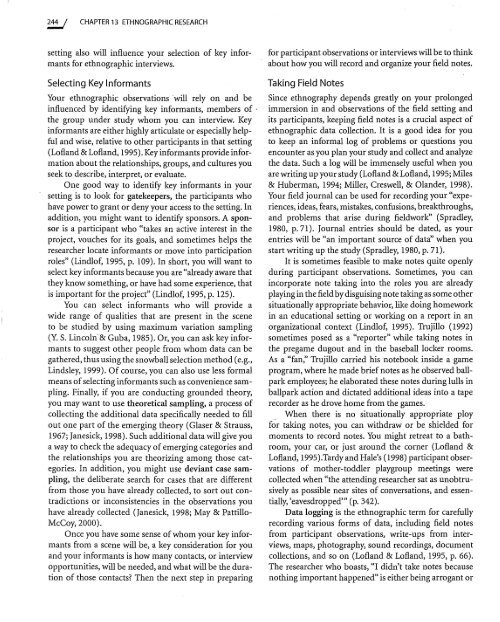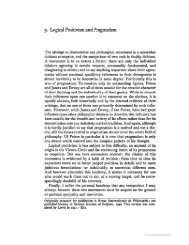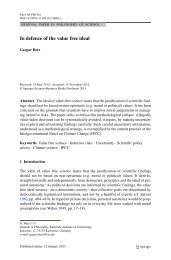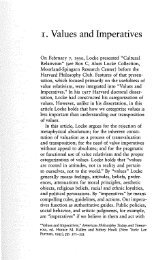Ethnographic Research - Matthew J. Brown
Ethnographic Research - Matthew J. Brown
Ethnographic Research - Matthew J. Brown
- No tags were found...
You also want an ePaper? Increase the reach of your titles
YUMPU automatically turns print PDFs into web optimized ePapers that Google loves.
244 / CHAPTER 13 ETHNOGRAPHIC RESEARCHsetting also will influence your selection of key informantsfor ethnographic interviews.Selecting Key InformantsYour ethnographic observations 'will rely on and beinfluenced by identifying key informants, members of 'the group under study whom you can interview. Keyinformants are either highly articulate or especially helpfuland wise, relative to other participants in that setting(Lofland & Lofland, 1995). Key informants provide informationabout the relationships, groups, and cultures youseek to describe, interpret, or evaluate.One good way to identify key informants in yoursetting is to look for gatekeepers, the participants whohave power to grant or deny your access to the setting. Inaddition, you might want to identify sponsors. A sponsoris a participant who "takes an active interest in theproject, vouches for its goals, and sometimes helps theresearcher locate informants or move into participationroles" (Lindlof, 1995, p. 109). In short, you will want toselect key informants because you are "already aware thatthey know something, or have had some experience, thatis important for the project" (Lindlof, 1995, p. 125).You can select informants who will provide awide range of qualities that are present in the sceneto be studied by using maximum variation sampling(Y. S. Lincoln' & Guba, 1985). Or, you can ask key informantsto suggest other people from whom data can begathered, thus using the snowball selection method (e.g.,Lindsley, 1999). Of course, you can also use less formalmeans of selecting informants such as convenience sampling.Finally, if you are conducting grounded theory,you may want to use theoretical sampling, a process ofcollecting the additional data specifically needed to fillout one part of the emerging theory (Glaser & Strauss,1967; Janesick, 1998). Such additional data will give youa way to check the adequacy of emerging categories andthe relationships you are theorizing among those categories.In addition, you might use deviant case sampling,the deliberate search for cases that are differentfrom those you have already collected, to sort out contradictionsor inconsistencies in the observations youhave already collected (Janesick, 1998; May & PattilloMcCoy, 2000).Once you have some sense of whom your key informantsfrom a scene will be, a key consideration for youand your informants is how many contacts, or interviewopportunities, will be needed, and what will be the durationof those contacts? Then the next step in preparingfor participant observations or interviews will be to thinkabout how you will record and organize your field notes.Taking Field NotesSince ethnography depends greatly on your prolongedimmersion in and observations of the field setting andits participants, keeping field notes is a crucial aspect ofethnographic data collection. It is a good idea for youto keep an informal log of problems or questions youencounter as you plan your study and collect and analyzethe data. Such a log will be immensely useful when youare writing up your study (Lofland & Lofland, 1995; Miles& Huberman, 1994; Miller, Creswell, & Olander, 1998).Your field journal can be used for recording your "experiences,ideas, fears, mistakes, confusions, breakthroughs,and problems that arise during fieldwork" (Spradley,1980, p.71). Journal entries should be dated, as yourentries will be "an important source of data" when youstart writing up the study (Spradley, 1980, p. 71).It is sometimes feasible to make notes quite openlyduring participant observations. Sometimes, you canincorporate note taking into the roles you are alreadyplaying in the field by disguising note taking as some othersituationally appropriate behavior, like doing homeworkin an educational setting or working on a report in anorganizational context (Lindlof, 1995). Trujillo (1992)sometimes posed as a "reporter" while taking notes inthe pregame dugout and in the baseball locker rooms.As a "fan:' Trujillo carried his notebook inside a gameprogram, where he made brief notes as he observed ballparkemployees; he elaborated these notes during lulls inballpark action and dictated additional ideas into a taperecorder as he drove home from the games.~ When there is no situationally appropriate ployfor taking notes, you can withdraw or be shielded formoments to record notes. You might retreat to a bathroom,your car, or just around the corner (Lofland &Lofland, 1995).Tardy and Hale's (1998) participant observationsof mother-toddler playgroup meetings werecollected when "the attending researcher sat as unobtrusivelyas possible near sites of conversations, and essentially,'eavesdropped'" (p. 342).Data logging is the ethnographic term for carefullyrecording various forms of data, including field notesfrom participant observations, write-ups from interviews,maps, photography, sound recordings, documentcollections, and so on (Lofland & Lofland, 1995, p. 66).The researcher who boasts, "I didn't take notes becausenothing important happened" is either being arrogant or






